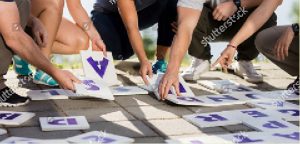
Time to Bin Teaching – Learners Know Best!
To be relevant into the future, Learning & Development needs to treat people as self-responsible and self-organized learners.
Most of us already have arrived in the new age when it comes to learning:
- We watch YouTube tutorials when we need to know how to do something we haven’t done before, like fixing a sink or using a formula in Excel
- We listen to podcasts on our way to work or use an app to learn a new language
- We constantly manage new apps, update their functions or learn how to use new gadgets in our day-to-day life
- We learn from people all over the world on social media platforms and other forums
Yet Learning & Development still treats participants as if they didn’t know best how to learn for themselves:
- We make people go through a predetermined sequence of activities
- We provide information, associated tasks and rewards when they complete something
- And worst, we behave as experts of their learning while ignoring their own expertise
It is high time to change the traditional approach of teaching to one that truly facilitates learning!
This is easier said than done: Professionals and participants alike have strong pictures of what formal learning looks like. And these are based on our own experience at school or in tertiary education.
Thus, participants automatically assume a role as consumer. They expect the experts to provide not only the goal but also the steps to get there.
And the professionals are only too happy to comply. After all, that’s what they do.
Contractors usually want to give the problem away: They need certain skills in their people, contract a training provider and expect the employees to assimilate what is offered. So, we all move in known terrain.
Solution
Disrupt this age-old pattern. Instead, encourage people to learn: self-responsibly, constantly and quickly. We can help people become successful by using a totally different approach to corporate learning.
Let’s leverage lessons learned from informal learning to create effective professional development for the future:
Let’s help participants to become responsible for their own learning journeys.
As L & D professionals, let’s start working at eye level with our participants. Let’s stop talking about consulting on the best structure, resources and environment to achieve learning goals. Let’s start supporting people to get there.
And let’s involve managers as responsible stakeholders in their employees’ development.
From Teaching to Learning – A Way to Make it Work:
- Embed the development program into an online learning platform that truly promotes collaboration:
- People can see who is part of their group and accompany their progress
- They can interact with the other group members through video calls, private and public messages – on all devices and wherever they are
- Participants themselves can include and schedule elements such as “learning lunches” or practice group meetings for topics like using a new tool or applying a technique
- They can share relevant articles, videos like TED talks or podcasts of related topics
- Participants and supervising managers discuss learning goals and schedule regular meetings to evaluate the progress
- Tools and resources are included from various relevant places:
- Websites like SurveyMonkey or MindMeister
- Apps like LinkedIn Learning, Learn2Learn or Meemo
- Or from the training provider and company sharepoints
- Off-site workshops with a focus on experiential activities and practice are key events. They serve as kick-off, milestone and at the end of the program to
- Strengthen the relationships between the learners
- Encourage sharing and thus learning from others
- Create emotional anchors for motivation and continuous engagement
- Individual or group coaching on specific topics (micro coaching) is offered where needed – face-to-face or virtually
- Tasks to apply the learning at work (e. i. “Make a SWOT analysis for scenario X and talk it through with your colleagues”) are a main focus and experiences shared with the other learners


